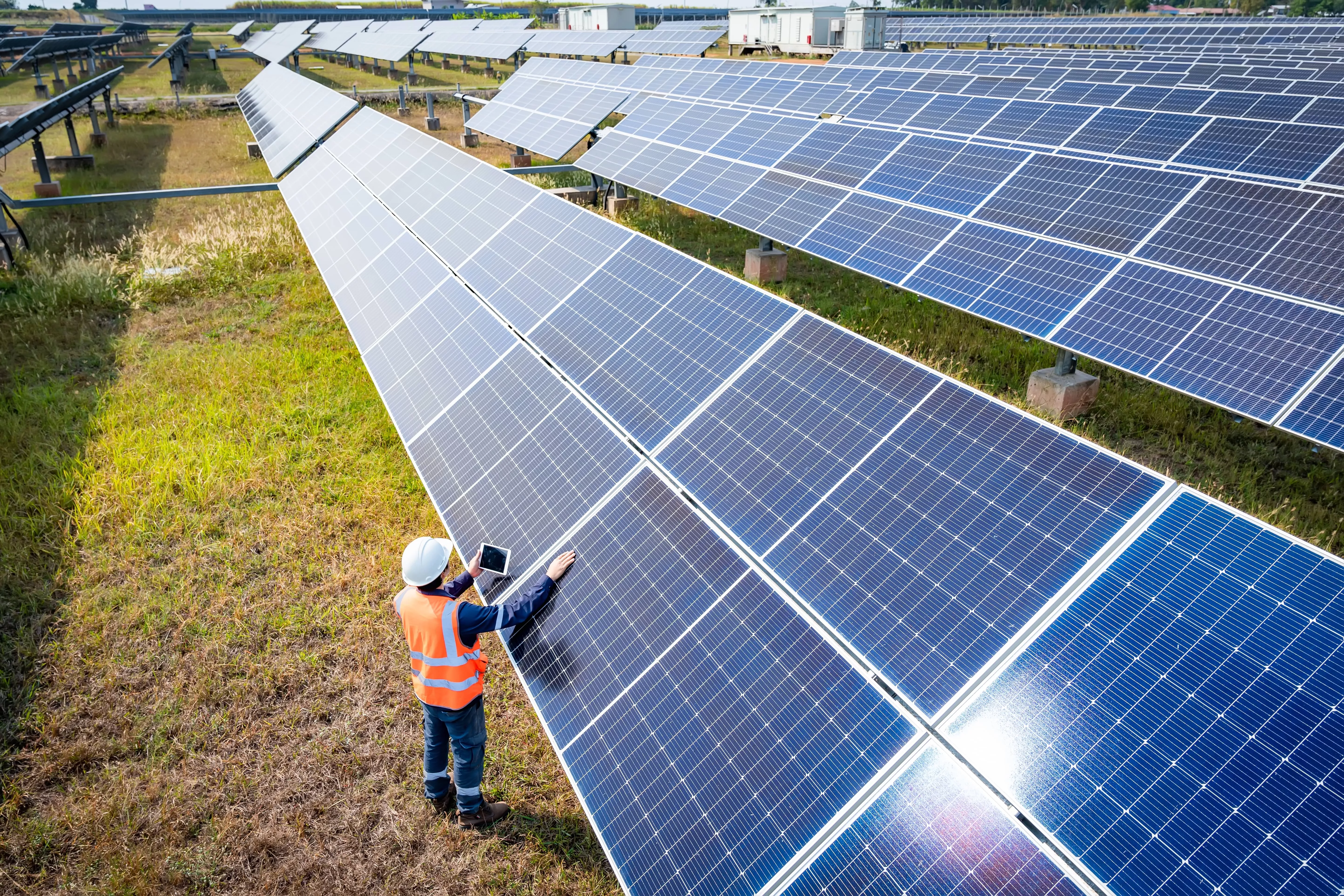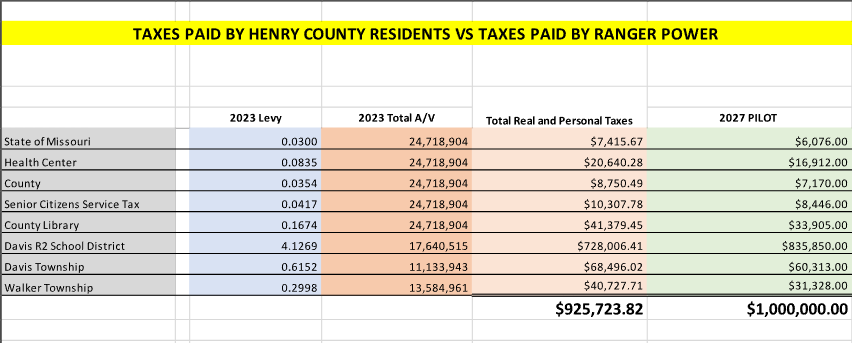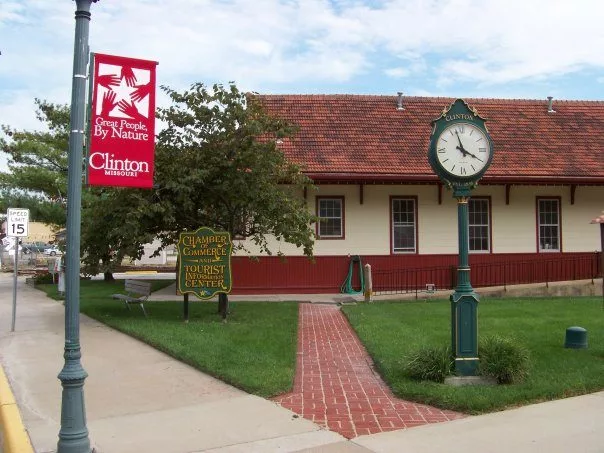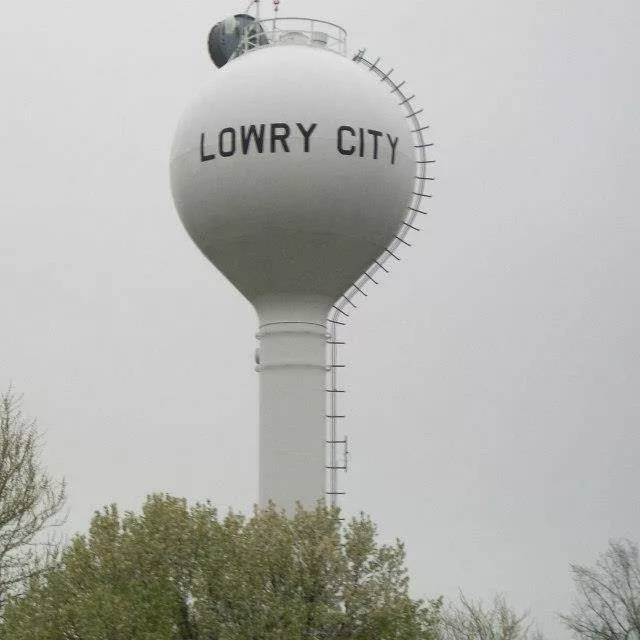
A town-hall meeting was held February 19th to discuss a future solar-panel farm in Montrose, MO. The project will be installed on land owned by Henry County residents who have already entered into agreements to lease their property to Ranger Power, a Chicago-based company who intends for the panels to remain for a period of approximately 25 years. The project will have financial benefits for Henry County, aside from the lease payments to landowners, but some community members have deep concerns about the project.
Concerned citizens of Henry County met Monday, February 19th, at the Montrose Community Building to gain information and share their concerns regarding a proposed solar farm in the Montrose area. Available in a panel to present information were representatives from Ranger Power Oliver Chag and Pete Endres, Henry County Clerk Rick Watson, local farmer Greg Westhusing, Callaway County Western District Commissioner Roger Fischer, and a landowner from Callaway County named Susan Burns. Fischer and Burns were present to give their impressions of a solar farm installed in Callaway County.
Each panel representative spoke in turn, describing the project from their perspective and their expectations for how it may impact Henry County. County Clerk Rick Watson explained that representatives from Ranger Power first approached Henry County approximately 6 years ago regarding their intentions to partner with local landowners, leasing privately owned agricultural land that is close to existing transmission lines from the now-closed KCP&L coal-burning power plant in Montrose.
County-Level Perspective
Watson explained that Ranger Power recently approached the commission again. Having leased sufficient acreage from landowners to move forward with their project, Ranger Power proposed a “Chapter 100” agreement with Henry County. A Chapter 100 agreement is a way for companies like Ranger Power to mitigate their potential risk that Missouri legislators could create taxes in the future that would affect their current cost-benefit analysis. The initial installation of the solar farm will require an investment from Ranger Power of an estimated $500 million and is planned to be a 25-year project. If new taxes are passed within that 25-year period, those taxes would diminish the planned profitability of the project. One way to avoid that risk is to transfer ownership of the panels themselves–though not the liability or responsibility–to the county. Watson explained to KDKD news in a follow-up call for information that a Chapter 100 agreement “is perfectly legal. It’s allowed with state statutes. . . It allows companies to make what is known as a PILOT–a payment in lieu of taxes.”
The PILOT payment in the proposed agreement will include $1 million per year, plus 2% compound interest, to the benefit of Henry County public institutions in accordance with county tax levies. Watson demonstrated how those funds would be apportioned, as shown in the green column below:

Watson emphasized that Ranger Power was not actually required to propose that payment; it’s an arrangement made with the county to mitigate the risk of potential state taxes that are not in force at this time. Watson also explained that Henry County does not have planning and zoning ordinances at the county level. In other words, as long as no laws are broken and all septic health ordinances are followed, the county does not dictate how individual landowners in rural Henry County use their property for residential or business purposes.
With that said, six townships in Henry County have planning and zoning ordinances at the township level. One of these, Walker Township, entails a portion of the proposed area of the solar farm; therefore, the Walker Township Planning and Zoning board has the ability to deny a property owner’s request to rezone land, previously used for agriculture, for inclusion in the solar farm. Not all of the land leased to Ranger Power is located within Walker Township, however; the remainder of the leased property is located in Davis Township, which does not have planning and zoning ordinances at the township level.
In addition to the PILOT agreement with Henry County, Ranger Power has signed a road-maintenance agreement with Henry County, explicitly agreeing that they will be responsible for any damage to roadways caused by heavy equipment brought in for construction and installation of the solar farm, and that they will repair those damages at their expense.
Citizen Concerns
Greg Westhusing, a Montrose farmer, spoke from the panel at the town-hall meeting about his own concerns regarding the project: “To the people who say ‘It’s my land; I should be able to do with it as I please,’ I don’t totally disagree. . . However, when that negatively impacts your friends, family, and neighbors. . . there’s a problem.” Westhusing shared two videos on the projector screen about potential drawbacks and dangers of solar power. Additional concerns expressed by Westhusing include the potential for fire, noise, disruption of wildlife, and potential future risk of losing land to eminent domain.
Josiah Town was present in the audience of the town-hall meeting, and spoke afterwards with KDKD News about his concerns regarding the solar farm project. “As a realtor, I’m concerned about property values…Owners have property rights, of course, but their neighbors also have the right to peacefully enjoy their own property.” Town said he wonders about the people in Montrose who live on family farms or who expected to retire to the peaceful countryside–even if they decide to sell their property and move away, he fears the proximity of the solar farm would cause a decrease in the value of the property or make it difficult to sell at all.
Town also expressed concerns about the eventual scope and extent of the project. “Some people say I’m from Clinton, so I shouldn’t oppose it…but what if this isn’t the end of it?” Town said he’s spoken with a landowner south of Urich who was allegedly contacted by a representative from Ranger Power about installing wind turbines on his property. Town postulated that if the transmission lines in Montrose can transmit more power than is generated by solar panels at the farm, then Ranger Power has incentive to expand their operations to maximize the power generated and increase their profits. Furthermore, Town reasoned, if Henry County has shown a lack of resistance to such projects, what is to stop other companies from beginning similar projects?
During the town-hall meeting, one audience member asked County Clerk Rick Watson asked just how a project like this one could be stopped: if enough citizens oppose this project, could it be taken to a vote? Watson explained that citizens could vote to add planning and zoning ordinances at the township level, but adding the issue to a ballot would require a petition with a sufficient number of signatures from within the township in question. “What about at the county level?” Well, it would have to be a county-wide petition to vote at the county level, Watson explained, and that would require a bigger number of signatures on the petition. Furthermore, the next possible election at which the issue could be voted upon would be August 2024. Watson explained that for citizens who want the ability to prevent future situations like this one, “you’d be wanting to create a planning and zoning ordinance for the county, …and I’m not sure–I would have to look it up–is if it would go to a vote or if it’s something the commission would adopt.”
Ranger Power Addresses Concerns
- Concern: Eminent Domain
Oliver Chag, project manager for the Montrose solar farm for Ranger Power, spoke on the panel at the town-hall meeting and did his best to alleviate the concerns of those present. Chag emphasized and repeated that Ranger Power does not have the ability to exercise eminent domain to take possession of anyone else’s property. Rather, he said, their goal is to create “true partnerships” by approaching willing landowners.
Some concerned parties online have brought up the concern of a recent bill signed into law by Missouri Governor Mike Parsons, fearing that the changes to eminent domain law would make it more likely for an electrical power plant to lead to land being claimed for public utility–interestingly, the bill most often referenced online is House Bill 2005, signed into law in 2022, which made it more difficult for the government to claim agricultural lands under eminent domain than other types of property, and added further protections for landowners whose land might potentially be claimed under eminent domain. Further protections for landowners against eminent domain are currently under consideration at Missouri legislation.
Eminent Domain laws allow governmental bodies to claim lands for public use–in urban areas, this may mean a property that is condemned being claimed by city council. The concern for many citizens is that a sufficient number of acreage being used for a solar farm in Montrose would lead to the state government claiming that it is being used for a public utility and claiming those acres, and the ones surrounding it, for long-term public use.
Ranger Power is not a public utility company or a co-op: they’re an independent power producer. They’re not even purchasing the land on which the solar panels will remain; they’re leasing it from current landowners, who are retaining ownership of their land, in a voluntary contract.
- Concern: Risk of Chemicals / Pollution / Environmental Impact
Chag further explained that the goal of a project like this one is to create the least amount of environmental impact possible. He said that solar power has no emissions and minimal water usage, and by building adjacent to the existing infrastructure left behind by the closed coal plant in Montrose, Ranger Power can use those lines without having to create and bury new ones. He called the solar farm a “plug and play” form of power generation: install metal pilings like screws in the ground, metal racking harnesses to hold the panels, inverters, the “brains” of the operation to convert the power from DC to AC, and a substation. Once the project is complete in approximately 25 years, Ranger Power will disassemble the solar panels and the supporting structures, remove the steel pilings, and the land should once again be usable for agriculture.
In a later Q&A session with audience members, Chag clarified that the plans for the solar farm do not include chemical batteries for power storage. What is planned? “A lot of steel, and a little concrete”: steel for pilings under the solar panels, a concrete pad for the small substation itself and “maybe a few” concrete pads for the power inverters. In a subsequent media release, Endres further explained, “Solar-generating facilities do not create odors or harmful byproducts and will not release toxic or hazardous substances into the environment.”
Chag further stated the panels that will be installed on the Montrose solar farm are the same type of panels that many homeowners install on private homes, consisting simply of a silica wafer to harness solar energy, an aluminum frame to hold the panel, and a layer of tempered glass on top. These panels are mounted to racking–a “tube” that holds electrical component for the project and will move over the day to track the sun from east to west to maximize the amount of power collected.
- Concern: Detriment to Wildlife
Under the panels, Chag explained, a native-seed mix of pollinator-friendly plants are seeded to create habitat for bees, birds, and to reduce soil erosion from water runoff. He said previous projects have partnered with local sheepherders to permit grazing beneath the panels. They do fence the solar panels–partly to keep out deer and prevent the panels, which Chag described as a “very expensive asset,” and for safety–after all, they are still an active electrical structure. Just because electrical wires are safe to connect to a home doesn’t mean someone should be climbing on a power line.
Ranger Power representative Pete Endres addressed the question of wildlife impact in the town-hall Q&A: he explained that their company is subject at the state-level to the regulatory authority of the Missouri Missouri Department of Conservation and to the Department of Natural Resources. Before a project like the solar farm is permitted to move forward, Ranger Power has been required to perform “a variety of studies that we submit to [these agencies] and get their ‘concurrence,’ basically that the project is not going to have any real impact.” Endres further explained that on a federal level, their project is also reviewed by the US Fish and Wildlife Service and the US Army Corps of Engineers: “there are federally protected species and then there’s state-protected species, and also wetlands are covered at both federal and state levels.” One audience member asked for further clarification regarding potential wildlife impact, and Endres elaborated: “As to the wildlife, that’s really where these state and federal agencies come in. . . we have to do a whole set of studies: wetlands, habitat assessment, bird counts. . . you name it. We document the entire footprint of the project area. And then we submit, essentially, a risk assessment to those agencies for their review, and get a concurrence back on our level of impact, and we keep that as low as possible.”
- Concern: Risk of Fire
One question addressed to Ranger Power was the increased risk of fire from the electrical array of the solar panels, and the ability of the existing fire department to deal with a potential electrical fire at a scale presented by the solar farm. Endres addressed the question: “we are 100 percent committed to training with local fire and other emergency personnel. We will sit down prior to construction [and] do training and informational sessions to get folks the knowledge that they need. . . and I know I’m being videotaped, so you can go back to that. . . We are happy to have those conversations at any time.” A media release attributed to Endres further explained that “a solar array is among the safest methods of producing electricity, and the risk of fire hazard is extremely low. With few exceptions, the components of a solar farm are not flammable, and the panels themselves and the supporting piles and racking do not burn. The primary risk of fire within a solar farm is from grass during dry times of the year, similar to the same risk that exists for pasture land or hay fields.” Endres didn’t specifically say so, but a reasonable inference can be made that the owners of an “expensive asset” like the solar panels would be concerned about their investment being damaged by fire, and would have a reasonable financial interest in helping local fire personnel be as prepared as possible to deal with such a potentiality– even aside from normal expectations of empathy, environmental stewardship, and public relations in general.
“Can we still oppose this?”
At this point, the contracts are signed. Henry County has no ordinances at the county level against private landowners signing leases with a company to install solar panels on agricultural land. County Clerk Rick Watson has been very forthright with requests for information from KDKD, in addition to speaking on the panel at the town-hall meeting on February 19th.
Some community members have expressed concerns about the aesthetics (or lack thereof) of the solar farm bordering their property, and the effect it may have on their property values. Some community members are concerned about the possibility that this project in Montrose will encourage similar projects in more locations in the county, and they will soon have a solar farm or a wind farm in their own backyard.
For county townships that currently have a planning and zoning ordinance in place, concerned citizens may contact the existing planning and zoning board for the township to discuss their concerns and express their preference against these projects. Some community members have proposed the idea of a county-wide zoning ordinance or more township-level zoning ordinances to prevent future projects, although it’s worth considering that landowners in a previously unzoned township may prefer not to be subject to zoning ordinances. A petition with a sufficient number of signatures could put the issue to a ballot, although not before the current solar farm proceeds in Davis Township.
Eileen Parks, moderator at the town-hall meeting, summarized the situation very eloquently: “I can tell you this. If you have signed your land up and you’re all for it, then you’re all for it. If you are not, then you need to speak up. You need to call your commissioners, you need to call your people that are in office, and you need to stand up and make a difference. . . [Walker Township] did the zoning for a reason. And there are other townships that are zoned around us . . . If you don’t like this, you need to speak up. It’s your right. And if you don’t do it, then it’s just going to go right on.”
“Phase One is complete”
For Davis Township, and the landowners who have leased their property to Ranger Power for the solar farm, the deal is done. To their credit, Ranger Power has been responsive to questions regarding the most alarming concerns: pollution, impact to wildlife behavior and habitat, increased risk of power, and loss of property due to eminent domain. They have signed agreements that will have great economic benefit to the county overall–and that’s aside from the financial benefits to the individual landowners, who have a new source of income from their land which is somewhat more predictable and reliable than hay prices, especially given drought conditions in recent years.
For community members who don’t support solar power as a long-term energy source, who don’t want to have to look at a solar farm near their property, who worry about the impact to their property values–well, you can’t control what your neighbors do with their land if there’s no law against it. The coal plant wasn’t exactly pretty, in a conventional sense, and the coal extraction process certainly had a strong impact on the local wildlife and habitat. Many farms in Henry County still have “strip pits” left behind from the coal extraction process, often used today as swimming holes and stock ponds. Henry County survived the coal plant, and adapted. We’ll survive this solar farm as well, and in 25 years, the panels will be disassembled and hauled away, hopefully with even less of a long-term impact than Mr. Peabody’s proverbial coal train.
*Video of the town-hall meeting from February 19th is available online, courtesy of audience-member Tyler Mahoney with Truman Lake Fishing Intel. Linked here with his permission: Part 1 and Part 2
**Special thanks to County Clerk Rick Watson, Ranger Power Vice President of Development Pete Endres, Josiah Town, and Tyler Mahoney for their assistance with additional information in writing this article.
by Adrianne Nichols, staff writer
Questions or corrections may be submitted to ANN@radfordmediagroup.com










